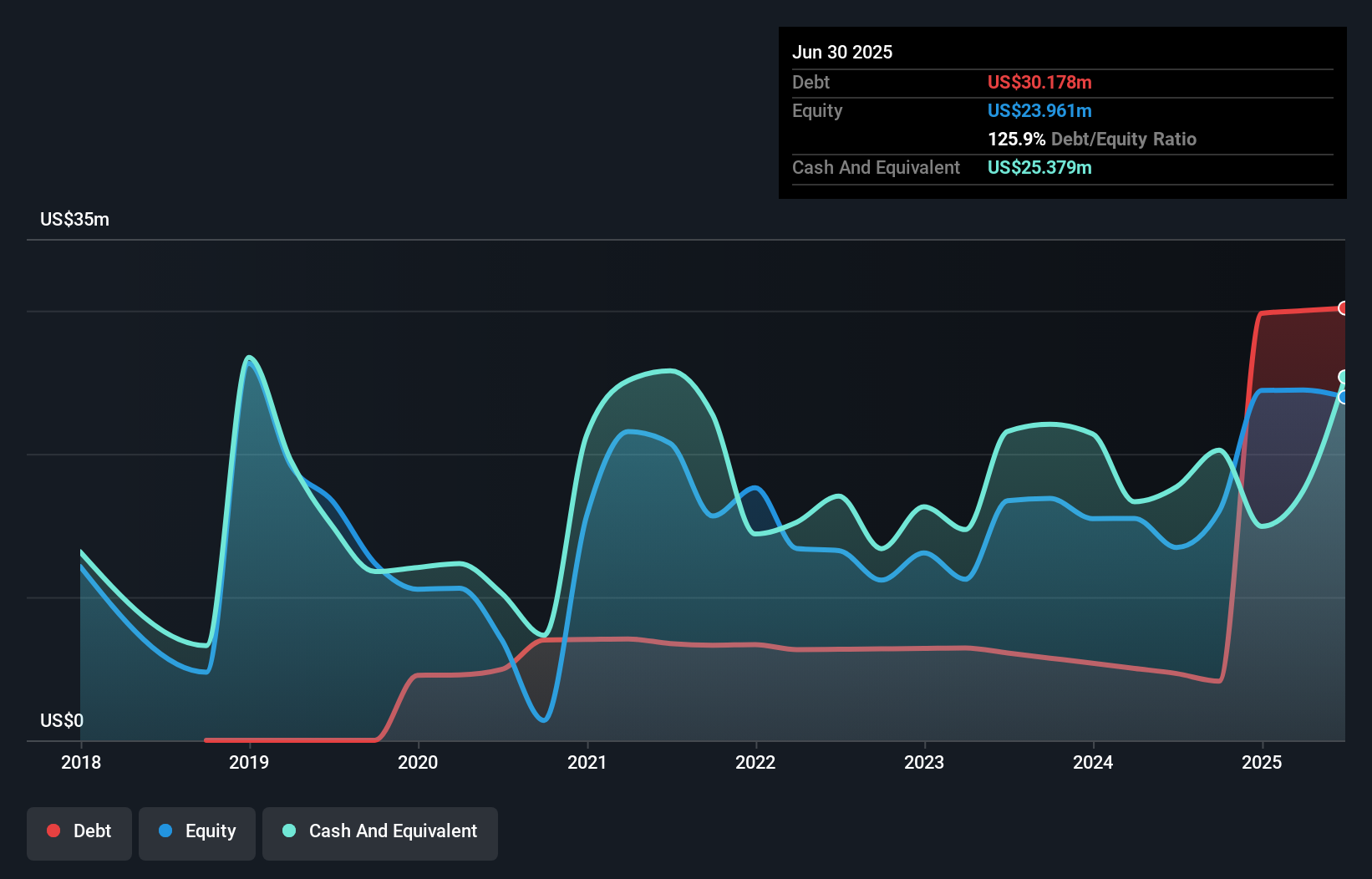- United States
- /
- Pharma
- /
- NasdaqGM:ETON
Here's Why Eton Pharmaceuticals (NASDAQ:ETON) Can Manage Its Debt Responsibly
David Iben put it well when he said, 'Volatility is not a risk we care about. What we care about is avoiding the permanent loss of capital.' It's only natural to consider a company's balance sheet when you examine how risky it is, since debt is often involved when a business collapses. Importantly, Eton Pharmaceuticals, Inc. (NASDAQ:ETON) does carry debt. But should shareholders be worried about its use of debt?
When Is Debt A Problem?
Debt assists a business until the business has trouble paying it off, either with new capital or with free cash flow. Part and parcel of capitalism is the process of 'creative destruction' where failed businesses are mercilessly liquidated by their bankers. However, a more frequent (but still costly) occurrence is where a company must issue shares at bargain-basement prices, permanently diluting shareholders, just to shore up its balance sheet. Of course, debt can be an important tool in businesses, particularly capital heavy businesses. The first thing to do when considering how much debt a business uses is to look at its cash and debt together.
What Is Eton Pharmaceuticals's Net Debt?
You can click the graphic below for the historical numbers, but it shows that as of June 2025 Eton Pharmaceuticals had US$30.2m of debt, an increase on US$4.66m, over one year. On the flip side, it has US$25.4m in cash leading to net debt of about US$4.80m.

How Strong Is Eton Pharmaceuticals' Balance Sheet?
Zooming in on the latest balance sheet data, we can see that Eton Pharmaceuticals had liabilities of US$38.6m due within 12 months and liabilities of US$39.1m due beyond that. On the other hand, it had cash of US$25.4m and US$14.5m worth of receivables due within a year. So its liabilities outweigh the sum of its cash and (near-term) receivables by US$37.9m.
Of course, Eton Pharmaceuticals has a market capitalization of US$492.6m, so these liabilities are probably manageable. Having said that, it's clear that we should continue to monitor its balance sheet, lest it change for the worse. Carrying virtually no net debt, Eton Pharmaceuticals has a very light debt load indeed.
See our latest analysis for Eton Pharmaceuticals
In order to size up a company's debt relative to its earnings, we calculate its net debt divided by its earnings before interest, tax, depreciation, and amortization (EBITDA) and its earnings before interest and tax (EBIT) divided by its interest expense (its interest cover). Thus we consider debt relative to earnings both with and without depreciation and amortization expenses.
Eton Pharmaceuticals has a very low debt to EBITDA ratio of 1.1 so it is strange to see weak interest coverage, with last year's EBIT being only 0.61 times the interest expense. So while we're not necessarily alarmed we think that its debt is far from trivial. Notably, Eton Pharmaceuticals made a loss at the EBIT level, last year, but improved that to positive EBIT of US$2.0m in the last twelve months. There's no doubt that we learn most about debt from the balance sheet. But ultimately the future profitability of the business will decide if Eton Pharmaceuticals can strengthen its balance sheet over time. So if you're focused on the future you can check out this free report showing analyst profit forecasts.
Finally, a business needs free cash flow to pay off debt; accounting profits just don't cut it. So it is important to check how much of its earnings before interest and tax (EBIT) converts to actual free cash flow. Over the last year, Eton Pharmaceuticals actually produced more free cash flow than EBIT. There's nothing better than incoming cash when it comes to staying in your lenders' good graces.
Our View
The good news is that Eton Pharmaceuticals's demonstrated ability to convert EBIT to free cash flow delights us like a fluffy puppy does a toddler. But the stark truth is that we are concerned by its interest cover. Looking at all the aforementioned factors together, it strikes us that Eton Pharmaceuticals can handle its debt fairly comfortably. On the plus side, this leverage can boost shareholder returns, but the potential downside is more risk of loss, so it's worth monitoring the balance sheet. There's no doubt that we learn most about debt from the balance sheet. But ultimately, every company can contain risks that exist outside of the balance sheet. For instance, we've identified 1 warning sign for Eton Pharmaceuticals that you should be aware of.
Of course, if you're the type of investor who prefers buying stocks without the burden of debt, then don't hesitate to discover our exclusive list of net cash growth stocks, today.
Valuation is complex, but we're here to simplify it.
Discover if Eton Pharmaceuticals might be undervalued or overvalued with our detailed analysis, featuring fair value estimates, potential risks, dividends, insider trades, and its financial condition.
Access Free AnalysisHave feedback on this article? Concerned about the content? Get in touch with us directly. Alternatively, email editorial-team (at) simplywallst.com.
This article by Simply Wall St is general in nature. We provide commentary based on historical data and analyst forecasts only using an unbiased methodology and our articles are not intended to be financial advice. It does not constitute a recommendation to buy or sell any stock, and does not take account of your objectives, or your financial situation. We aim to bring you long-term focused analysis driven by fundamental data. Note that our analysis may not factor in the latest price-sensitive company announcements or qualitative material. Simply Wall St has no position in any stocks mentioned.
About NasdaqGM:ETON
Eton Pharmaceuticals
A pharmaceutical company, focuses on developing and commercializing treatments for rare diseases.
High growth potential with excellent balance sheet.
Market Insights
Community Narratives




